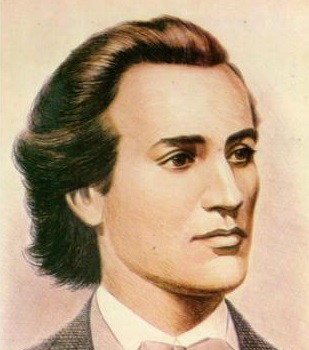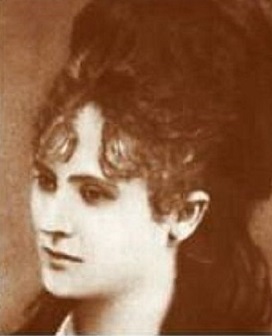You are here
January 15, 2017 - National Culture Day, 167 years after the birth of the poet Mihai Eminescu! 15.01.2017
January 15, 2017 - National Culture Day. Music Salon "Eugen Doga" (Romanian language)

Mihai Eminescu was born on January 15, 1850 in the village of Botoșani, Romania. The poet would later be referred to as the beacon, “the morning star of Romanian literature.” His poetry is now renowned all over the world, printed in countless editions. His poems have been translated into seventy languages and some of them have become folk songs. Hundreds of books have been written about his life and death; memorials in his honor have been erected and streets named after him. The year 1989, the 100th anniversary of Eminescu’s death, was declared ‘International Eminescu Year’ by UNESCO and he was also named ‘poet of the year’ in 2000.
Unfortunately, the poet neither received such acclaim nor enjoyed fame during his lifetime.
Despite the fact that Mihai Eminescu’s contemporaries were impressed by the broad scope of his education, his intelligence, the richness of his poetic style and the unique harmony present in his poetry, Eminescu’s life was filled with depravation, wandering, hostile attitude towards him, ceaseless work and poverty.
The great poet died at the age of 39. As it tends to happen, after his death indifference and lack of understanding turned into glorification and he became a symbol.
Eugen Doga’s life and creative path are closely connected with Eminescu. Eugen Doga lives on Eminescu Street. The majority of Doga’s works are based on Eminescu’s poems about his tender and unfulfilled love for the golden-haired poetess Veronica Micle.
The only book published during Eminescu’s lifetime saw the light at the end of 1883. A hundred years later, in 1983, Eugen Doga’s ballet ‘Star Dreams of the Princess’ based on Eminescu’s ‘Luceafarul’ (libretto of Emil Loteanu) premiered at the Kishinev Theater of Opera and Ballet. As the ballet progresses, fantastic images of vast cosmos are replaced by scenes of life in the royal court. We see a princess that falls in love with a celestial star, Luceafarul, the son of the Sun, who descends to her from faraway space. But there is no happy ending: Luceafarul offers the princess to become immortal but she’s afraid; he agrees to become mortal for her but she has already fallen for a pageboy. In the end, the earthly world of the princess and the cosmic kingdom of Luceafarul cannot meet.
 Similarly, Mihai Eminescu and Veronica Micle couldn’t be together.
Similarly, Mihai Eminescu and Veronica Micle couldn’t be together.
They were 22 years old when they met in Vienna, the capital of waltz. Even before her trip to Vienna, Veronica had seen Mihai Eminescu’s poems in a magazine and had written a poem about it:
Their love story had moments of careless happiness that turned into hatred and despair, jealousy and separation, then, once again, into happiness.
They were inevitably attracted to each other; their invisible connection was never compromised.
I am the shore, you are the sea.
You are the night, I am a star,
My beloved,
Beloved.
And I love you too,
My beloved!
This connection might exist beyond life, who knows… In any case, their names are forever bound together as a symbol of love with its marvelous flight and shattering blows, its irresistible power and magical illusions. It’s a story of immortal and eternal love.
Eugen Doga composed an opera about this love called ‘Dialogues of Love’. The composer was inspired by the lovers’ poems that transmit their heartbeat, their love, their jealousy, their tenderness and passion.
Eugen Doga has also composted romances, choir pieces and arias based on Mihai Eminescu’s poetry… and he continues to compose new pieces.
“I feel extremely happy when I sit down at the piano with Eminescu’s poems. This day is a celebration not only of Eminescu’s birth but also of our culture, our national spirituality and even of existence in general. So I wish everybody happiness in the world of Eminescu!” said Eugen Doga.
1997-2017 (c) Eugen Doga. All rights reserved.




